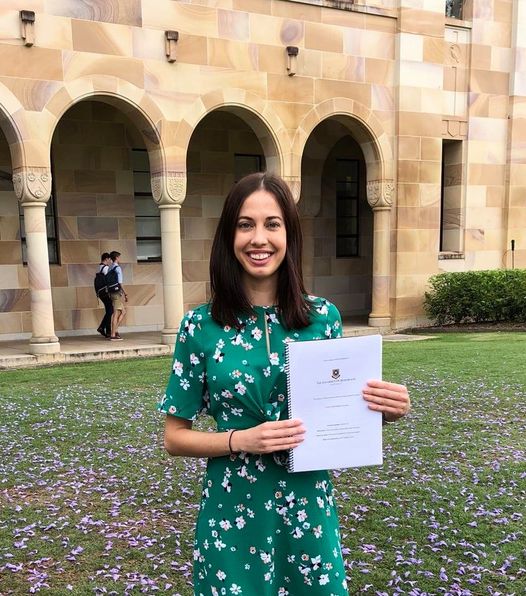The School of Health and Rehabilitation Sciences' 3 Minute Thesis (3MT) competition is back, with a host of new and returning HDR students competing for the opportunity to represent the School at the Faculty 3MT final and beyond.
We caught up with last year’s School, Faculty and UQ winner Emma Schimke to find out about her experience in the 2020 competition, and whether she has any advice for those taking part this year.

This time last year you were preparing to compete in UQ’s 2020 3MT competition. Why did you decide to compete in the 3MT? What were you hoping to get out of it?
I decided to compete in the 3MT after watching the Asia-Pacific Final at the beginning of my candidature. I was impressed by how the competitors were able to communicate their specific field of research in an engaging and accessible format. I felt that competing would provide me with the opportunity to share my research with a non-specialist audience and also help me continue to develop my presentation skills.
Reading an 80,000 word thesis would take around 9 hours. 3MT competitors describe their research in 3 minutes! How did you go about doing that?
It was a challenging but rewarding process! I started off by attending a 3MT workshop and watched past presentations. It was clear that I needed to think about the bigger picture and ultimately what I am aiming to achieve with my research. It was important to tell a story and start with a hook at the beginning to draw the audience in. My original script was too long, so I kept cutting back and refining. It was helpful to consider the key points I wanted to communicate within the three minutes.
Looking back nearly a year on since you won the 2020 3MT competition, how has it influenced your approach to your work and your time here at UQ more generally?
Winning the 3MT competition has helped me to publicize myself as a researcher and gain more media exposure. Since the competition I have engaged with the wider community across a number of formats including podcasts, live radio and a university webinar. I feel that competing in the 3MT has helped me to have more confidence in presentation skills. I believe the skills I gained from the 3MT can also be utilised in future situations when I may be required to pitch my research or engage members of the public with the work I do.
The COVID-19 pandemic has meant that last year’s 3MT competition was a virtual event, where competitors submitted video-recordings of their 3MTs. The same format is being followed this year. What do you think of the change from a live to virtual format? Do you think it changes the way that competitors approach the competition?
I feel that the change came with unique benefits. The virtual competition helped me develop the ability to convey my research in a video format, which was something I had never done before the 3MT. Pre-recorded presentations are becoming more common with the shift to virtual conferences in recent times, so I believe this is an important skill for any researcher to develop. I also think that the virtual format enhanced audience accessibility and may have resulted in the competition being viewed by more members of the public outside of the immediate UQ community.
I believe the virtual format may result in some small changes in the way competitors approach the competition. I think one key difference was that as you can’t move around a stage, it becomes even more important to utilise other non-verbal communication skills to enhance your delivery (e.g., looking into the camera, facial expressions, etc).
Finally, what advice would you give to people competing in the 3MT this year?
I would recommend people start off the process by attending a 3MT or presentation skills workshop and review the judging criteria. I also found it helpful to watch past competitor presentations. When competing, I would encourage people to show passion and enthusiasm, tell a story and enjoy the process!
View Emma's winning 3MT presentation here
Emma is currently a PhD candidate with UQ's School of Health and Rehabilitation Sciences. Her research is focused on examining the role of sleep in word learning and memory consolidation. Emma is also a speech pathologist who received her Bachelor of Speech Pathology with first class honours in 2015. She has clinical experience working with children with communication difficulties in private practice and enjoys working with university students as a clinical educator and tutor. Emma is looking forward to completing a UQ Placement with a government organisation after submitting her thesis later this year.
The School of Health and Rehabilitation Sciences' 3MT competition will be livestreamed on Tuesday 20 July. For more information about the UQ 3MT competition click here.
You may also be interested in: If you snooze, you… win! PhD student’s sleep research takes out 3MT



